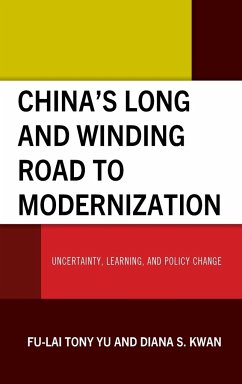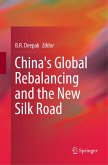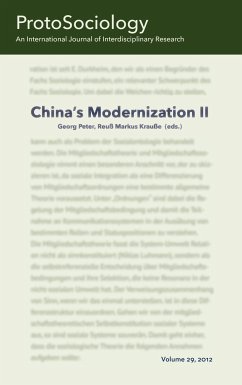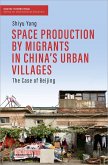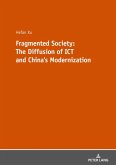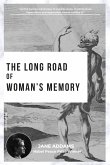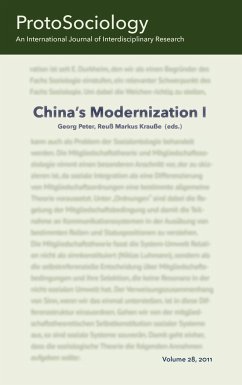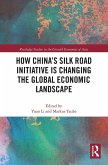Fu-Lai Tony Yu, Diana S. Kwan
China's Long and Winding Road to Modernization
Uncertainty, Learning, and Policy Change
Fu-Lai Tony Yu, Diana S. Kwan
China's Long and Winding Road to Modernization
Uncertainty, Learning, and Policy Change
- Gebundenes Buch
- Merkliste
- Auf die Merkliste
- Bewerten Bewerten
- Teilen
- Produkt teilen
- Produkterinnerung
- Produkterinnerung
This book adopts Austrian and evolutionary approaches to interpret contemporary China's economic transformation under uncertainty, learning and experimentation. It incorporates culture, institutions, government agents and entrepreneurship to understand policy making in China.
Andere Kunden interessierten sich auch für
![China's Global Rebalancing and the New Silk Road China's Global Rebalancing and the New Silk Road]() China's Global Rebalancing and the New Silk Road67,99 €
China's Global Rebalancing and the New Silk Road67,99 €![China's Modernization II China's Modernization II]() China's Modernization II32,00 €
China's Modernization II32,00 €![Space Production by Migrants in China's Urban Villages Space Production by Migrants in China's Urban Villages]() Shiyu YangSpace Production by Migrants in China's Urban Villages28,99 €
Shiyu YangSpace Production by Migrants in China's Urban Villages28,99 €![Fragmented Society: The Diffusion of ICT and China¿s Modernization Fragmented Society: The Diffusion of ICT and China¿s Modernization]() Hefan XuFragmented Society: The Diffusion of ICT and China¿s Modernization60,45 €
Hefan XuFragmented Society: The Diffusion of ICT and China¿s Modernization60,45 €![The long road of woman's memory The long road of woman's memory]() Jane AddamsThe long road of woman's memory13,99 €
Jane AddamsThe long road of woman's memory13,99 €![China's Modernization I China's Modernization I]() China's Modernization I32,00 €
China's Modernization I32,00 €![How China's Silk Road Initiative is Changing the Global Economic Landscape How China's Silk Road Initiative is Changing the Global Economic Landscape]() How China's Silk Road Initiative is Changing the Global Economic Landscape60,99 €
How China's Silk Road Initiative is Changing the Global Economic Landscape60,99 €-
-
-
This book adopts Austrian and evolutionary approaches to interpret contemporary China's economic transformation under uncertainty, learning and experimentation. It incorporates culture, institutions, government agents and entrepreneurship to understand policy making in China.
Hinweis: Dieser Artikel kann nur an eine deutsche Lieferadresse ausgeliefert werden.
Hinweis: Dieser Artikel kann nur an eine deutsche Lieferadresse ausgeliefert werden.
Produktdetails
- Produktdetails
- Verlag: Lexington Books
- Seitenzahl: 298
- Erscheinungstermin: 5. September 2023
- Englisch
- Abmessung: 235mm x 157mm x 22mm
- Gewicht: 637g
- ISBN-13: 9781666934403
- ISBN-10: 1666934402
- Artikelnr.: 68172637
- Herstellerkennzeichnung
- Libri GmbH
- Europaallee 1
- 36244 Bad Hersfeld
- gpsr@libri.de
- Verlag: Lexington Books
- Seitenzahl: 298
- Erscheinungstermin: 5. September 2023
- Englisch
- Abmessung: 235mm x 157mm x 22mm
- Gewicht: 637g
- ISBN-13: 9781666934403
- ISBN-10: 1666934402
- Artikelnr.: 68172637
- Herstellerkennzeichnung
- Libri GmbH
- Europaallee 1
- 36244 Bad Hersfeld
- gpsr@libri.de
By Fu-Lai Tony Yu and Diana S. Kwan
Part I. Theoretical Framework
Chapter 1. Mainstream Neoclassical School versus Austrian Economics:
Efficiency versus Coordination
Chapter 2. Interpreting Chinese History in Phenomenological Perspective
Chapter 3. Origins of Chinese Way of National Management: Confucianism,
Absolute Monarchy and Patriotism
Part II. China's Economic Management during 1950-1978: Venturing into a
Radical Socialist Regime
Chapter 4. An Overview of China's Economic Transformation in Evolutionary
Perspective: Uncertainty, Experimentation and Policy Change
Chapter 5. The Cultural Revolution Revisited: Mao's Personality, Chinese
Culture and Mentality
Chapter 6. Uncertainty and Policy Making for a Public Mega Project in
Communist China: The Case of the Three Gorges Dam
Part III. Groping for Chinese Stones to Cross Turbulent Rivers: China's
Economic Reform after 1979
Chapter 7. Leadership Selection and Power Succession: The Case of "Hu-Wen
Team"
Chapter 8. From Low-end 'Shanzhai' to High-end Brand Models: The Case of
China's Mobile Phone Industry
Chapter 9. Enter the Dragon Beer: Tsingtao Goes Global
Part IV. China's Rise as a Global Power
Chapter 10. Nationalism, Neo-mercantilist Policy and China's Rise as a
Global Power
Chapter 11. The US-China Trade Disputes and the Struggle of Hegemony in the
Global Economy
Chapter 12. Cultural Value Differences between the United States and China
and their Impacts on Everyday Life, Innovation Capabilities and Combating
Coronavirus Pandemic
Part V. The Epilogue
Chapter 13. Modernizing China in Japanese Way? The Role of Culture and
Institution in Economic Development
Chapter 1. Mainstream Neoclassical School versus Austrian Economics:
Efficiency versus Coordination
Chapter 2. Interpreting Chinese History in Phenomenological Perspective
Chapter 3. Origins of Chinese Way of National Management: Confucianism,
Absolute Monarchy and Patriotism
Part II. China's Economic Management during 1950-1978: Venturing into a
Radical Socialist Regime
Chapter 4. An Overview of China's Economic Transformation in Evolutionary
Perspective: Uncertainty, Experimentation and Policy Change
Chapter 5. The Cultural Revolution Revisited: Mao's Personality, Chinese
Culture and Mentality
Chapter 6. Uncertainty and Policy Making for a Public Mega Project in
Communist China: The Case of the Three Gorges Dam
Part III. Groping for Chinese Stones to Cross Turbulent Rivers: China's
Economic Reform after 1979
Chapter 7. Leadership Selection and Power Succession: The Case of "Hu-Wen
Team"
Chapter 8. From Low-end 'Shanzhai' to High-end Brand Models: The Case of
China's Mobile Phone Industry
Chapter 9. Enter the Dragon Beer: Tsingtao Goes Global
Part IV. China's Rise as a Global Power
Chapter 10. Nationalism, Neo-mercantilist Policy and China's Rise as a
Global Power
Chapter 11. The US-China Trade Disputes and the Struggle of Hegemony in the
Global Economy
Chapter 12. Cultural Value Differences between the United States and China
and their Impacts on Everyday Life, Innovation Capabilities and Combating
Coronavirus Pandemic
Part V. The Epilogue
Chapter 13. Modernizing China in Japanese Way? The Role of Culture and
Institution in Economic Development
Part I. Theoretical Framework
Chapter 1. Mainstream Neoclassical School versus Austrian Economics:
Efficiency versus Coordination
Chapter 2. Interpreting Chinese History in Phenomenological Perspective
Chapter 3. Origins of Chinese Way of National Management: Confucianism,
Absolute Monarchy and Patriotism
Part II. China's Economic Management during 1950-1978: Venturing into a
Radical Socialist Regime
Chapter 4. An Overview of China's Economic Transformation in Evolutionary
Perspective: Uncertainty, Experimentation and Policy Change
Chapter 5. The Cultural Revolution Revisited: Mao's Personality, Chinese
Culture and Mentality
Chapter 6. Uncertainty and Policy Making for a Public Mega Project in
Communist China: The Case of the Three Gorges Dam
Part III. Groping for Chinese Stones to Cross Turbulent Rivers: China's
Economic Reform after 1979
Chapter 7. Leadership Selection and Power Succession: The Case of "Hu-Wen
Team"
Chapter 8. From Low-end 'Shanzhai' to High-end Brand Models: The Case of
China's Mobile Phone Industry
Chapter 9. Enter the Dragon Beer: Tsingtao Goes Global
Part IV. China's Rise as a Global Power
Chapter 10. Nationalism, Neo-mercantilist Policy and China's Rise as a
Global Power
Chapter 11. The US-China Trade Disputes and the Struggle of Hegemony in the
Global Economy
Chapter 12. Cultural Value Differences between the United States and China
and their Impacts on Everyday Life, Innovation Capabilities and Combating
Coronavirus Pandemic
Part V. The Epilogue
Chapter 13. Modernizing China in Japanese Way? The Role of Culture and
Institution in Economic Development
Chapter 1. Mainstream Neoclassical School versus Austrian Economics:
Efficiency versus Coordination
Chapter 2. Interpreting Chinese History in Phenomenological Perspective
Chapter 3. Origins of Chinese Way of National Management: Confucianism,
Absolute Monarchy and Patriotism
Part II. China's Economic Management during 1950-1978: Venturing into a
Radical Socialist Regime
Chapter 4. An Overview of China's Economic Transformation in Evolutionary
Perspective: Uncertainty, Experimentation and Policy Change
Chapter 5. The Cultural Revolution Revisited: Mao's Personality, Chinese
Culture and Mentality
Chapter 6. Uncertainty and Policy Making for a Public Mega Project in
Communist China: The Case of the Three Gorges Dam
Part III. Groping for Chinese Stones to Cross Turbulent Rivers: China's
Economic Reform after 1979
Chapter 7. Leadership Selection and Power Succession: The Case of "Hu-Wen
Team"
Chapter 8. From Low-end 'Shanzhai' to High-end Brand Models: The Case of
China's Mobile Phone Industry
Chapter 9. Enter the Dragon Beer: Tsingtao Goes Global
Part IV. China's Rise as a Global Power
Chapter 10. Nationalism, Neo-mercantilist Policy and China's Rise as a
Global Power
Chapter 11. The US-China Trade Disputes and the Struggle of Hegemony in the
Global Economy
Chapter 12. Cultural Value Differences between the United States and China
and their Impacts on Everyday Life, Innovation Capabilities and Combating
Coronavirus Pandemic
Part V. The Epilogue
Chapter 13. Modernizing China in Japanese Way? The Role of Culture and
Institution in Economic Development

